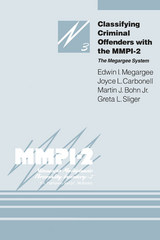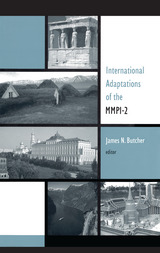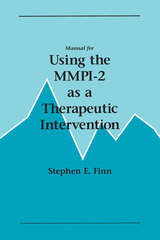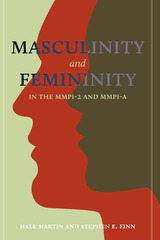6 books about MMPI - 2

Assessment of Chronic Pain Patients with the MMPI-2
Laura S. Keller
University of Minnesota Press, 1991
Supplies clinicians with data on the applicability of previous MMPI chronic pain research to the revised version of the test.
[more]

Classifying Criminal Offenders with the MMPI-2
The Megargee System
Edwin I. Megargee
University of Minnesota Press, 2001
An essential resource for employing this widely used personality assessment test in correctional settings.
Originally developed in the 1970s and now revised for the MMPI-2, the Megargee System provides a method for classifying criminal offenders into groups based on their MMPI-2 profiles. This empirically derived system has been investigated in a wide variety of criminal justice settings including corrections, probation, and parole. It has been tested in minimum, medium, and maximum federal, state, and military correctional institutions, in local jails, in halfway houses, and in forensic mental health units. Its use has been extended to female offenders, older men, and juvenile delinquents. Integrating thirty years of research, this new resource fully evaluates the reliability, validity, sources, and uses of the Megargee system.
Classifying Criminal Offenders with the MMPI-2 describes how the system was originally derived and validated and gives instructions on how to classify the original MMPI and MMPI-2 profiles of male and female criminal offenders. It integrates the findings of more than one hundred independent studies with previously unpublished original research investigating the characteristics of each of the system's empirically derived male and female types. On the basis of these data, the authors recommend the optimal settings, change agents, and treatment programs for each type of offender.
As the basic reference work on the MMPI-2 Megargee system, this volume will be an essential resource for criminal justice practitioners, psychologists interested in the MMPI-2, and researchers in criminal classification and personality assessment.
Edwin I. Megargee is professor of psychology at Florida State University and recognized as the foremost expert on the use of the MMPI instruments in correctional settings. Joyce L. Carbonell is professor of psychology at Florida State University. Martin J. Bohn Jr. is chief psychologist at Florida State Hospital. Greta L. Sliger is a clinical psychologist in Tallahassee, Florida.
[more]

Essentials of MMPI-2 and MMPI-A Interpretation
James N. Butcher
University of Minnesota Press, 2000

International Adaptations of the MMPI-2
Research and Clinical Applications
James N. Butcher
University of Minnesota Press, 1996

Manual for Using the MMPI-2 as a Therapeutic Intervention
Stephen E. Finn
University of Minnesota Press, 1996
This manual provides a step-by-step procedure, tested in controlled research and illustrated with case examples, for using the MMPI-2 as a therapeutic intervention. Finn covers all stages of the MMPI-2 assessment, from the initial interview, through the scoring and interpretation of the test, and culminating in the feedback session. The goal of this approach is to gather accurate information about clients with the MMPI-2 and then to use this information to help clients understand themselves and make positive changes in their lives.Finn's appraoch advocates the dynamic involvement of client and assessor both before and after testing. This appraoch to assessment is very timely given the demands that managed care is making for demonstration of treatment efficacy.Stephen Finn is Director of the Center for Therapeutic Assessment in Austin, Texas.
[more]

Masculinity and Femininity in the MMPI-2 and MMPI-A
Hale Martin
University of Minnesota Press, 2010
Masculinity and femininity remain among the more confounding constructs in the history of personality psychology and psychological assessment. In spite of years of research and thousands of empirical studies, masculinity and femininity are still so fraught with confusion and political controversy that several prominent psychologists have suggested that the terms be abandoned. In this informative book, Hale Martin and Stephen E. Finn bring clarity to this topic by comprehensively reviewing past research and theory and extensively exploring "masculinity" and "femininity" as they are measured in the widely used MMPI instruments.
Martin and Finn consider the factor structure and correlates of masculinity and femininity in the MMPI in multiple samples. Through their analyses, they are able to address such questions as: Is there such a thing as masculinity/femininity? If so, are masculinity and femininity separate constructs, or are they opposite ends of a bipolar dimension? What are the core aspects of masculinity and femininity? Are they the same for men and women? Do the meanings of masculinity and femininity vary across the human life span and in different cultures? To what extent are masculinity and femininity biologically or socially determined? Can masculinity and femininity be adequately measured by the MMPI-2 and MMPI-A?
This insightful work uses solid empirical methods to clarify significant constructs. It will be an essential resource for researchers in the areas of personality, psychological assessment, and gender studies, as well as for clinicians working with clients who have nontraditional gender identities.
[more]
READERS
Browse our collection.
PUBLISHERS
See BiblioVault's publisher services.
STUDENT SERVICES
Files for college accessibility offices.
UChicago Accessibility Resources
home | accessibility | search | about | contact us
BiblioVault ® 2001 - 2024
The University of Chicago Press









